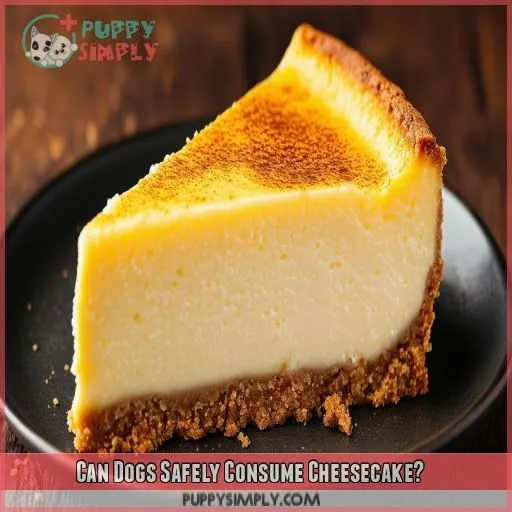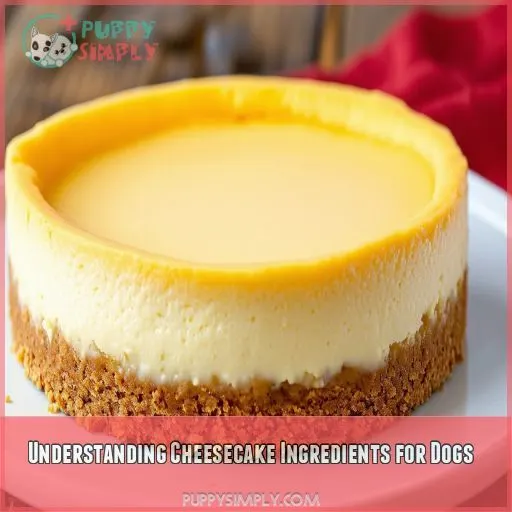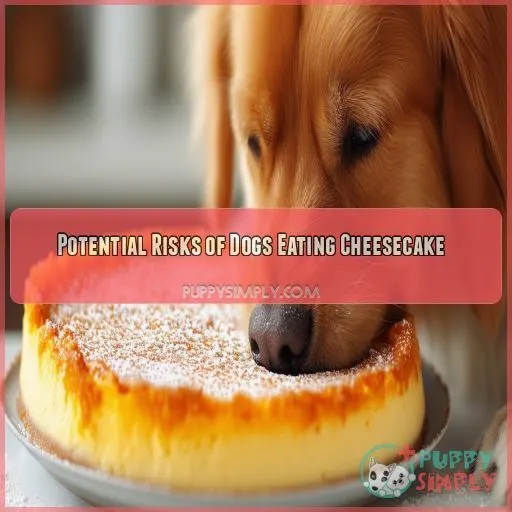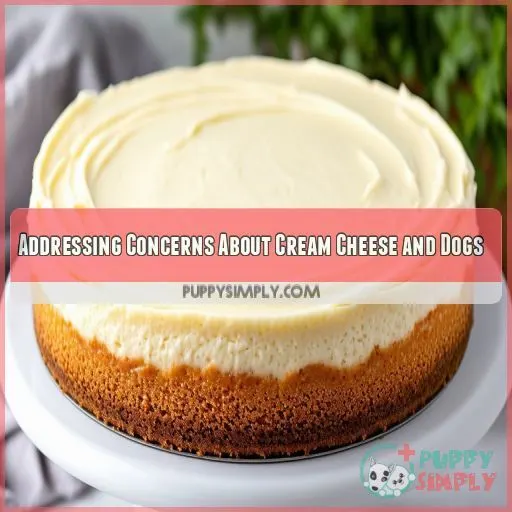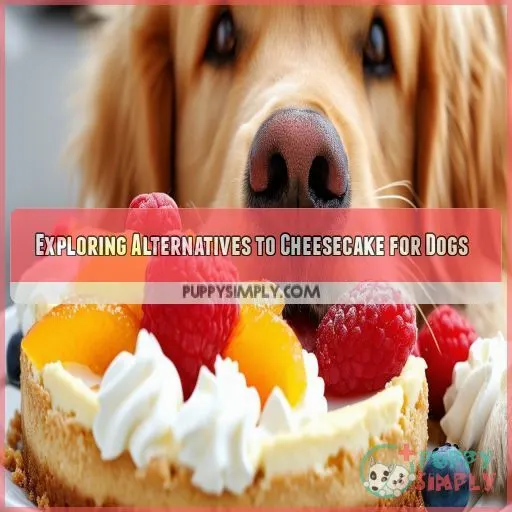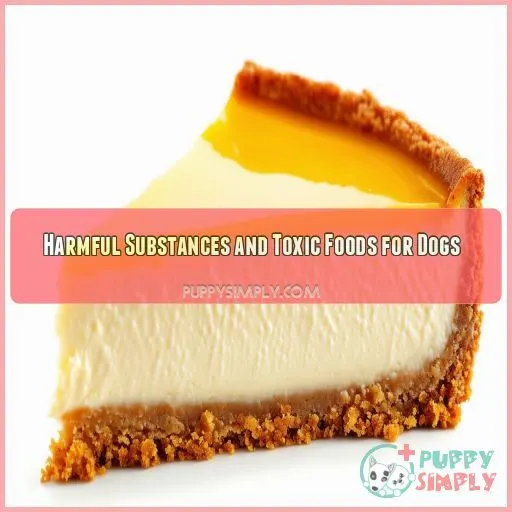This site is supported by our readers. We may earn a commission, at no cost to you, if you purchase through links.
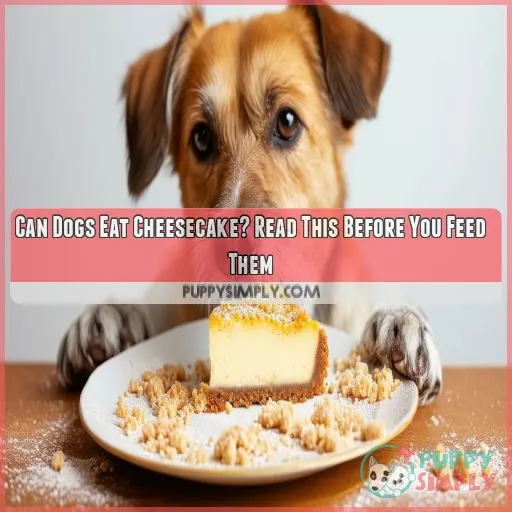
It’s important to understand the risks and benefits before feeding your dog human food.
Table Of Contents
- Key Takeaways
- Can Dogs Eat Cheesecake?
- Can Dogs Safely Consume Cheesecake?
- Understanding Cheesecake Ingredients for Dogs
- Potential Risks of Dogs Eating Cheesecake
- Addressing Concerns About Cream Cheese and Dogs
- Exploring Alternatives to Cheesecake for Dogs
- Harmful Substances and Toxic Foods for Dogs
- Frequently Asked Questions (FAQs)
- Is it safe for dogs to eat cheesecake?
- Can dogs lick cream cheese?
- Why can’t dogs eat cheese?
- What if my dog ate chocolate cheesecake?
- Can dogs safely eat sugar-free cheesecake?
- Are there long-term health effects from dogs eating cheesecake?
- What quantity of cheesecake is harmful to dogs?
- Which cheesecake ingredients are harmful to dogs?
- What sweet treats can dogs safely enjoy?
- Conclusion
Key Takeaways
- Dogs can have their cake and eat it too… well, sort of. A tiny nibble of cheesecake won’t hurt your furry friend, but it’s definitely not the healthiest treat in the doggy bag.
- Watch out for the sweet stuff! Xylitol, that sneaky Sugar substitute, is a big no-no for pups. It’s about as welcome in their diet as a cat at a dog park.
- Cheesecake might be your guilty pleasure, but for Fido, it’s more like a ticking time bomb. Too much of this creamy delight can lead to a whole host of health issues, from tummy troubles to an expanding waistline.
- Why not whip up some homemade, dog-friendly treats instead? Your pooch will be wagging their tail for some yogurt or pumpkin puree faster than you can say "who wants walkies?
Can Dogs Eat Cheesecake?
While dogs can technically eat small amounts of plain cheesecake, it’s not recommended. The high fat content can lead to pancreatitis, and the sugar may contribute to weight gain and diabetes. Some cheesecakes contain xylitol, which is toxic to dogs.
Lactose intolerance is common in dogs, potentially causing digestive upset. Even without these issues, cheesecake doesn’t align with your dog’s nutritional needs.
It’s best to stick to dog-friendly treats or consult your vet for safe alternatives. If you’re ever unsure about a food’s safety for your furry friend, it’s always better to err on the side of caution.
Let’s explore some healthier options for your pup’s palate.
Can Dogs Safely Consume Cheesecake?
Can dogs safely eat cheesecake? The short answer is yes, they can, but only in moderation and as an occasional treat.
It is important to keep the portions small, as cheesecake is not a healthy snack for dogs due to its high fat content.
Consuming too much fat can lead to digestive issues and weight gain in dogs. Always avoid giving your dog cheesecake that contains xylitol. This artificial sweetener is toxic to dogs and can cause xylitol poisoning.
If you are unsure about the ingredients in the cheesecake, it is better to offer alternative treats, such as plain yogurt, cottage cheese, or apple slices.
When introducing any new food to your dog’s diet, it is important to monitor them for any signs of gastrointestinal upset, such as vomiting or diarrhea. If adverse reactions occur, discontinue giving them cheesecake.
Understanding Cheesecake Ingredients for Dogs
When it concerns providing cheesecake to your dog, it’s critical to comprehend the possible hazardous ingredients it may contain. Xylitol, a regular sugar substitute, is extremely toxic to dogs and can cause significant health concerns if ingested.
Harmful Substances in Cheesecake
Cheesecake may contain ingredients that are harmful to dogs, so it’s important to be aware of the risks before giving your dog this treat. One of the biggest concerns is xylitol, a sugar substitute commonly found in sugar-free or low-carb cheesecakes. Xylitol is highly toxic to dogs and can cause a range of serious health issues, including digestive upset, excessive drinking and urination, and even liver failure.
Even without xylitol, cheesecake can still pose risks to your dog’s health. The high fat content can lead to pancreatitis, a potentially life-threatening condition. Additionally, the rich and creamy nature of cheesecake can cause gastrointestinal upset, resulting in vomiting and diarrhea.
The high sugar content in cheesecake can also contribute to weight gain and diabetes, especially if fed regularly. It’s important to remember that dogs have different nutritional needs than humans, and what may be a tasty treat for us can be harmful to them.
Identifying Potential Allergens
While some dogs may enjoy a bite of cheesecake as an occasional treat, it’s important to be mindful of potential allergens in this dessert. Common cheesecake ingredients that could trigger allergies or sensitivities in dogs include:
- Lactose intolerance: Dogs can struggle to digest lactose, a sugar found in dairy products like cream cheese and sour cream. This can lead to stomach upset and diarrhea.
- Casein sensitivity: Casein is a protein in milk and dairy products. Some dogs may be sensitive to it, resulting in digestive issues.
- Egg allergy: Eggs are a common ingredient in cheesecake, but some dogs may be allergic, leading to skin issues and gastrointestinal problems.
- Wheat allergy: Wheat flour is often used in the crust, but it can cause allergies or sensitivities in some dogs, resulting in skin and digestive problems.
- Sugar sensitivity: Cheesecake is typically high in sugar, which can cause blood sugar spikes and contribute to weight gain and diabetes in dogs.
Potential Risks of Dogs Eating Cheesecake
While it is true that dogs can eat cheesecake in moderation, there are potential risks to be aware of.
The main concern is xylitol poisoning. Even a small amount of this artificial sweetener can be harmful to dogs and cause digestive upset and other serious health issues.
Cheesecake is also high in fat. Consuming too much can lead to pancreatitis and weight gain.
It is important to remember that cheesecake should only be given as a rare treat and in small portions. If you are unsure, it is best to avoid giving your dog cheesecake altogether. Instead, opt for healthier alternatives such as plain yogurt, cottage cheese, or training treats designed for dogs, which are portion-controlled and will not harm their health.
Addressing Concerns About Cream Cheese and Dogs
While cream cheese isn’t toxic to dogs, it’s not the healthiest option either. It’s high in fat, which can lead to obesity and other health issues like pancreatitis. Plus, some dogs are lactose intolerant, so they might experience digestive issues like gas, bloating, and diarrhea.
Additionally, cream cheese can be a breeding ground for bacteria, especially if it’s left out at room temperature for too long. This could result in bacterial contamination, leading to food poisoning in dogs.
Exploring Alternatives to Cheesecake for Dogs
Instead of feeding your dog cheesecake, consider offering them healthy and safe treats like plain yogurt, cottage cheese, and pumpkin puree. You can also make homemade dog-friendly desserts to provide a wholesome alternative.
Healthy and Safe Treats for Dogs
While cheesecake isn’t toxic to dogs, it’s not exactly healthy either. If you’re looking for healthy and safe treats for your dog, here are some alternatives:
- Plain yogurt
- Cottage cheese
- Pumpkin puree
- Sweet potato
These options provide your dog with a tasty treat without the potential health risks associated with cheesecake. Remember, even healthy treats should be given in moderation as part of a balanced diet.
Making Homemade Dog-friendly Desserts
Making homemade dog-friendly desserts is a fun and healthy alternative to store-bought treats if you’re feeling creative.
You can find a variety of dog-friendly recipes online that use safe and nutritious ingredients for your furry friend.
Always prioritize your dog’s health and well-being when choosing ingredients. Consult your veterinarian if you’re unsure about any ingredients or recipes.
Harmful Substances and Toxic Foods for Dogs
When it comes to harmful substances and toxic foods for dogs, it’s essential to be vigilant. While cheesecake may be a tempting treat for your furry friend, it’s important to remember that dogs can be lactose intolerant, just like humans. Lactose intolerance in dogs can lead to digestive issues, including vomiting, diarrhea, and even pancreatitis.
Additionally, cheese itself isn’t necessarily a healthy option for dogs. While it may not be toxic, it’s high in fat and can contribute to weight gain and other health issues, such as diabetes.
Frequently Asked Questions (FAQs)
Is it safe for dogs to eat cheesecake?
Yes, dogs can eat cheesecake but only in small amounts and as a rare treat. Avoid giving your dog cheesecake that contains xylitol, which is toxic to dogs. Monitor your dog for any adverse reactions and stop giving them cheesecake if they show any signs of illness.
Can dogs lick cream cheese?
Dogs can lick cream cheese, but only in small amounts and as a rare treat. Cream cheese isn’t toxic to dogs, but it’s high in calories and fat. It may also cause vomiting, diarrhea, gas, or an allergic reaction.
Why can’t dogs eat cheese?
Dogs can’t eat cheese because they can’t fully digest dairy products, so it may cause an upset stomach. Cheese is also high in fat, which can lead to weight gain and pancreatitis. Blue cheese is especially toxic to dogs and can cause vomiting and seizures.
What if my dog ate chocolate cheesecake?
Chocolate is toxic to dogs in moderate to large quantities. A single bite of chocolate cheesecake likely won’t do any long-term damage, but a few slices can increase the danger. Contact your vet or a poison helpline immediately if your dog has eaten chocolate cheesecake.
Can dogs safely eat sugar-free cheesecake?
No, sugar-free cheesecake isn’t safe for dogs. Sugar substitutes like xylitol are toxic to dogs and can lead to liver failure or hypoglycemia.
Are there long-term health effects from dogs eating cheesecake?
Regularly feeding your dog cheesecake can lead to chronic health problems like obesity, diabetes, and heart issues. Sugar, fat, and calories can cause stomach inflammation and digestive issues. Cheesecake is a nutritional nightmare for dogs.
What quantity of cheesecake is harmful to dogs?
Any amount of cheesecake is harmful to dogs, especially in large quantities. Even one slice of cheesecake has a high calorie count.
Which cheesecake ingredients are harmful to dogs?
Xylitol is a common ingredient in sugar-free desserts that can be toxic to dogs, causing digestive upset and other issues. Avoid sugar-free cheesecakes, and always monitor your dog for any adverse reactions after consuming cheesecake.
What sweet treats can dogs safely enjoy?
Dogs can safely enjoy a range of sweet treats, including peanut butter, sweet potato, and yogurt. You can even bake your own doggie treats with these ingredients! Just be sure to avoid grapes, raisins, and chocolate, which are toxic to dogs.
Conclusion
As a dog owner, you might be tempted to share your cheesecake with your furry friend, but it’s important to proceed with caution. While some ingredients in cheesecake may be safe for dogs, others could pose potential risks.
It’s essential to understand the possible allergens and harmful substances present in cheesecake. Ultimately, there are healthier and safer treat alternatives for your dog that you can explore.

